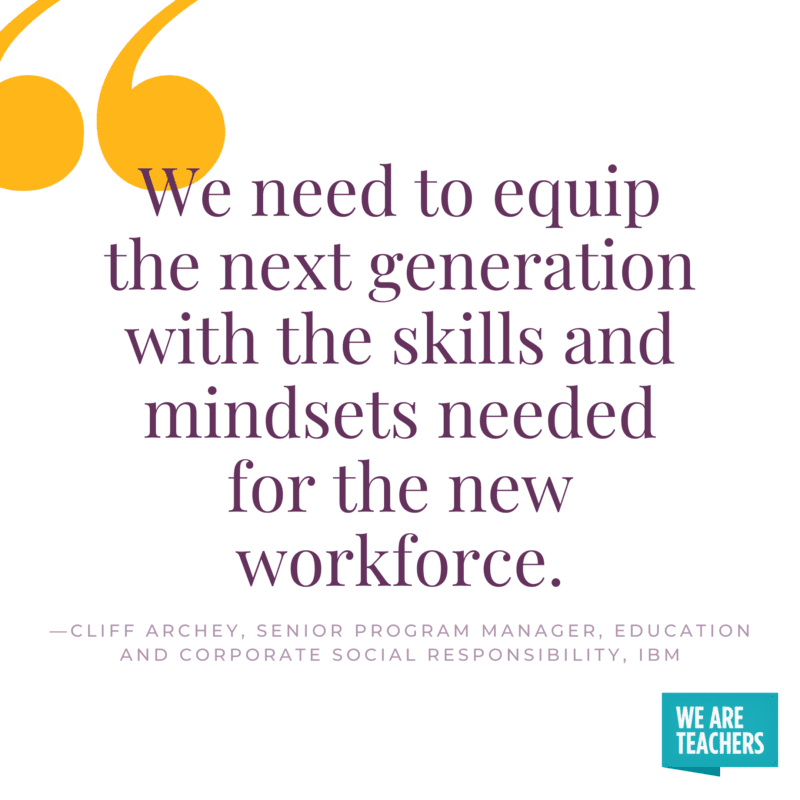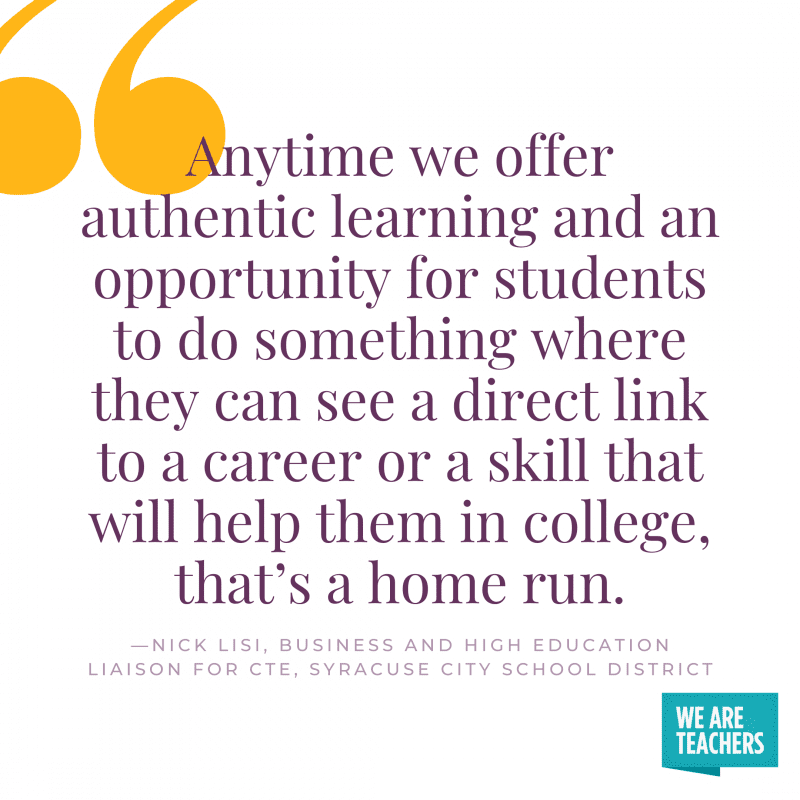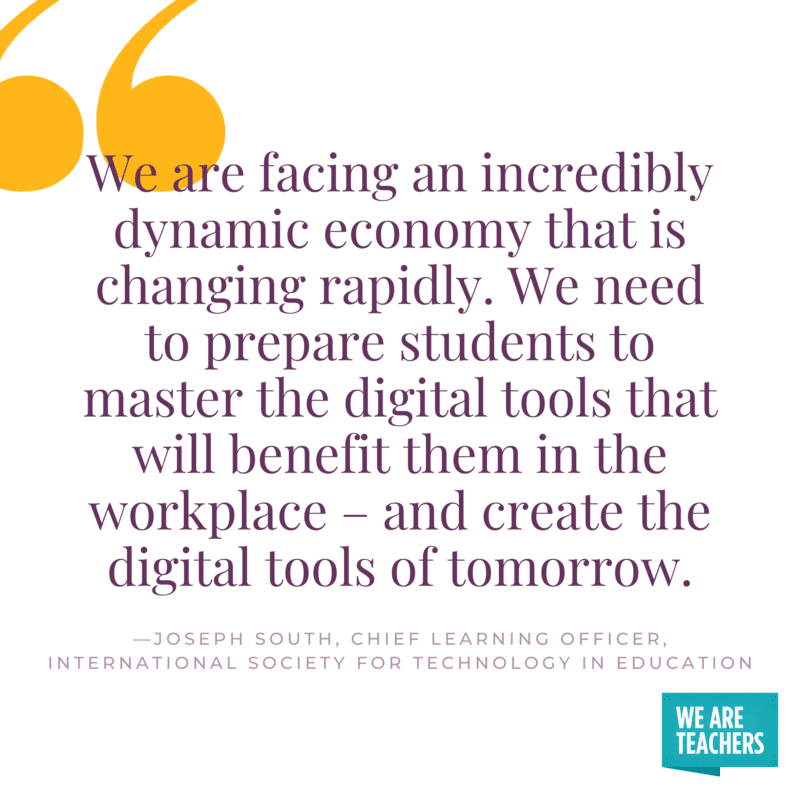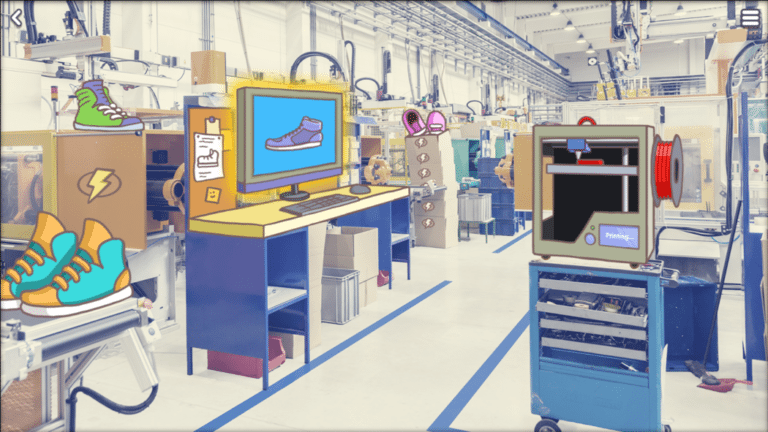The world of work is quickly changing. As educators, we want to prepare our students for their future careers. But to do that, many schools need to ramp up instruction in real-world professional skills and teach emerging technology skills across subject areas.
By 2022, the World Economic Forum predicts 42% of jobs will require emerging technology skills such as data analytics, design thinking, and artificial intelligence. Companies will also place a premium on employees who can bring creativity, critical thinking, resilience, flexibility, and complex problem solving to their positions.
“We need to equip the next generation with the skills and mindsets needed for the new workforce,” says Cliff Archey, senior program manager for education and corporate social responsibility for IBM.

Local professionals partner with schools
In Syracuse, New York, digital skills are woven throughout the public school district’s 27 career technical education programs including cybersecurity, computer information systems, and an engineering pathway that focuses on drones.
Students engage when they have a chance to problem-solve relevant projects with professionals, and employers look for graduates who are excited about work, says Nick Lisi, business and high education liaison for CTE for the district.
“Anytime we offer authentic learning and an opportunity for students to do something where they can see a direct link to a career or a skill that will help them in college, that’s a home run,” says Lisi, adding that curriculum also emphasizes effective communication and working in teams.
Syracuse offers students the option of earning digital badges through IBM’s free Open P-TECH program. Working at their own pace online, students can learn things like how to build their own chatbot. They can also learn blockchain essentials, Python coding for data science, machine learning, and more. Lisi says students are motivated when they add badges to their resumes to improve their future job prospects.

Teachers provide real-world examples
Travis Brown, an algebra and pre-calculus teacher at Adamson P-TECH, a school in Dallas, says integrating real-world examples and using Open P-TECH with his high school students exposes them to the technology they will encounter in the workplace. It also prompts deeper discussions about learning.
“I’m caring less about the content and more about the underlying skills and mindset I teach my students,” says Brown. “They need to be problem solvers who are versatile and able to learn and adapt to technology.”
When Brown incorporates blockchain and artificial intelligence into his projects, it challenges his students in various ways. Plus it’s more fun than simply drilling them with math problems. He encourages students to “puzzle through problems” together, try new approaches, and justify their positions—skills that are vital in the workplace.
Jobs require digital skills and soft skills
To put our students on the right trajectory for career success, we need to teach emerging technology because these skills are necessary for almost every field, says Joseph South, chief learning officer for the International Society for Technology in Education based in Arlington, Virginia.
“We are facing an incredibly dynamic economy that is changing rapidly,” South says. “We need to prepare students to master the digital tools that will benefit them in the workplace—and create the digital tools of tomorrow.”
Those who code and develop artificial intelligence also need to be able to empathize and innovate with integrity. Beyond the knowledge, schools can help students learn how to define problems and engage in innovative thinking that results in a productive solution.

Teachers and students co-learn tech skills
Many educators don’t feel equipped to teach emerging technology skills, but Open P-TECH promotes co-learning where teachers can earn badges alongside their students—a powerful model of lifelong learning, South notes.
Experts say schools can teach emerging technology by weaving these topics into existing lessons in economics, computer science, and math. Mary Gordon, who did data analysis on Wall Street and now teaches math at Newburgh Free Academy P-TECH in Newburgh, New York, shares with her students why math is important in business. She says recent projects about blockchain and cryptocurrency fascinated her students.
“It opens up their minds to what is out there in the real world,” says Gordon, who had her students do presentations on the subjects to polish their professional skills.
Students avoid steep learning curves
If we don’t introduce students to these emerging technologies in high school, they may face a significant learning curve once in the workforce, says Archey. More than mastering coding or one software language, IBM aims to increase the pipeline of new hires who have good computational thinking and know how to learn.
“We want people who are agile in how they approach work,” Archey says. “It’s essential to be able to collaborate. You can’t do anything in a silo.”
Archey adds, “We know enough about the pace of change that technology imparts on society and the working world to know that education systems are not structured to keep up with that change. The more businesses can work with educators to help them up … That’s the only way we are going to stay competitive globally and school systems are going to stay relevant.”
Emerging technology teaching tips
Here are some steps educators can take to prepare students for careers that require emerging technology skills:
- Seek out partnerships with local businesses to provide opportunities for students to engage with technology professionals.
- Provide students with authentic project-based learning opportunities that incorporate real-world examples.
- Infuse your curriculum with lessons that develop professional skills, such as problem-solving, empathy, and integrity.
- Learn emerging technology skills alongside your students through free courses such as those offered by IBM’s Open P-TECH Program.
Give your students access to free digital courses in emerging technology
Your school can get free access to IBM’s Open P-TECH. It provides students and teachers with digital learning on the technology and professional skills of tomorrow. They can take self-paced courses in artificial intelligence, cybersecurity, blockchain, data science, design thinking, and more. Click the button below to learn more and request a free school account by filling out the quick organization sign-up form at the bottom of the page.
Yes, I Want to Learn More About Open P-TECH



